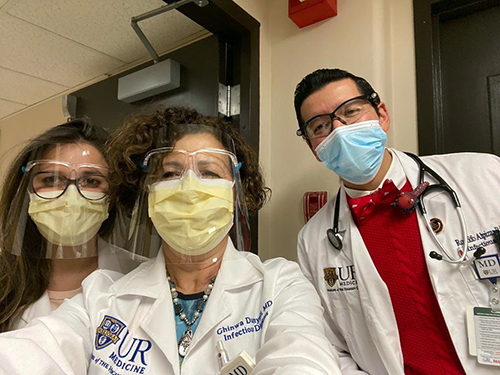About the Program
 Clinical training is provided primarily on the adult in-patient services and in the Infectious Diseases clinics at the University of Rochester's Strong Memorial Hospital (SMH). Additional in-patient experience is acquired on pediatric services at SMH, and at University-affiliated community hospitals in Rochester. Clinics include general Infectious Diseases Clinic, AIDS Clinic, Travel Medicine Clinic, and the Sexual Health Clinic.
Clinical training is provided primarily on the adult in-patient services and in the Infectious Diseases clinics at the University of Rochester's Strong Memorial Hospital (SMH). Additional in-patient experience is acquired on pediatric services at SMH, and at University-affiliated community hospitals in Rochester. Clinics include general Infectious Diseases Clinic, AIDS Clinic, Travel Medicine Clinic, and the Sexual Health Clinic.
Fellows in Infectious Diseases see a broad variety of infectious disease problems in both hospitalized and ambulatory patients. As a referral center for bone marrow transplantation, organ transplantation (liver, kidney, pancreas, and heart), oncology, burns, trauma, and AIDS care, SMH offers exposure to the full spectrum of infectious complications in the compromised patient. Intensive Care Units in medicine, surgery, cardiovascular diseases, pediatrics, neonatology, burn/trauma, and neurosurgery provide specialized care to critically ill patients from a wide region of western New York and Pennsylvania. SMH and the affiliated hospitals, all with active emergency departments, also admit patients with typical community-acquired infections such as pneumonia, cellulitis, osteomyelitis, endocarditis, and meningitis.
Trainees are assigned to in-patient infectious disease services for approximately 12 months during a two-year fellowship. Most of the first year of training is devoted to in-patient rotations at SMH on the general Infectious Diseases Service, AIDS Service, and Transplant ID Service. Trainees have few clinical rotations in the second year, allowing substantial time for research. Rotations on infectious disease consultation services at affiliated hospitals during both years provide additional clinical experience and afford the trainee an increasing level of clinical responsibility. In-patient rotations on Pediatric Infectious Diseases are optional.
A variety of clinical conferences ensure that trainees acquire broad knowledge of infectious diseases and allied disciplines, including infection control and hospital epidemiology. In addition, 2 weeks during the first year of fellowship is spent in the Clinical Microbiology Laboratories, learning about diagnostic laboratory procedures which are crucial to the role of the infectious diseases physician. This experience is designed to provide the trainee a basic understanding of diagnostic techniques in bacteriology, virology, mycology, serology, and parasitology.
What our fellows say...

"I chose the ID fellowship at University of Rochester because it not only fulfilled my criteria for broad-based comprehensive clinical training in infectious diseases including transplant ID, but also opportunities and resources for cutting edge research as well as mentorship in a variety of possible career paths such as medical education."
Rodolfo Alpizar-Rivas, MD
Residency / St. Elizabeth Medical Center Internal Medicine Residency, Boston MA
Hometown / San Jose, Costa Rica